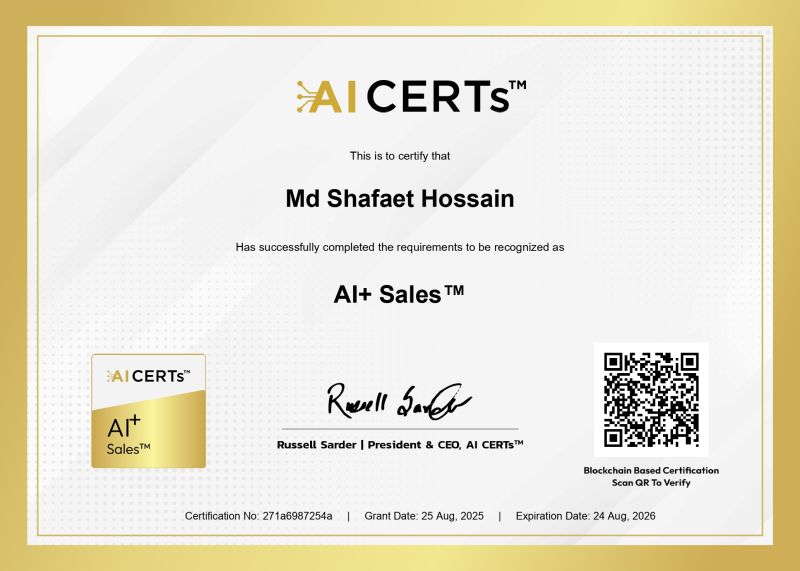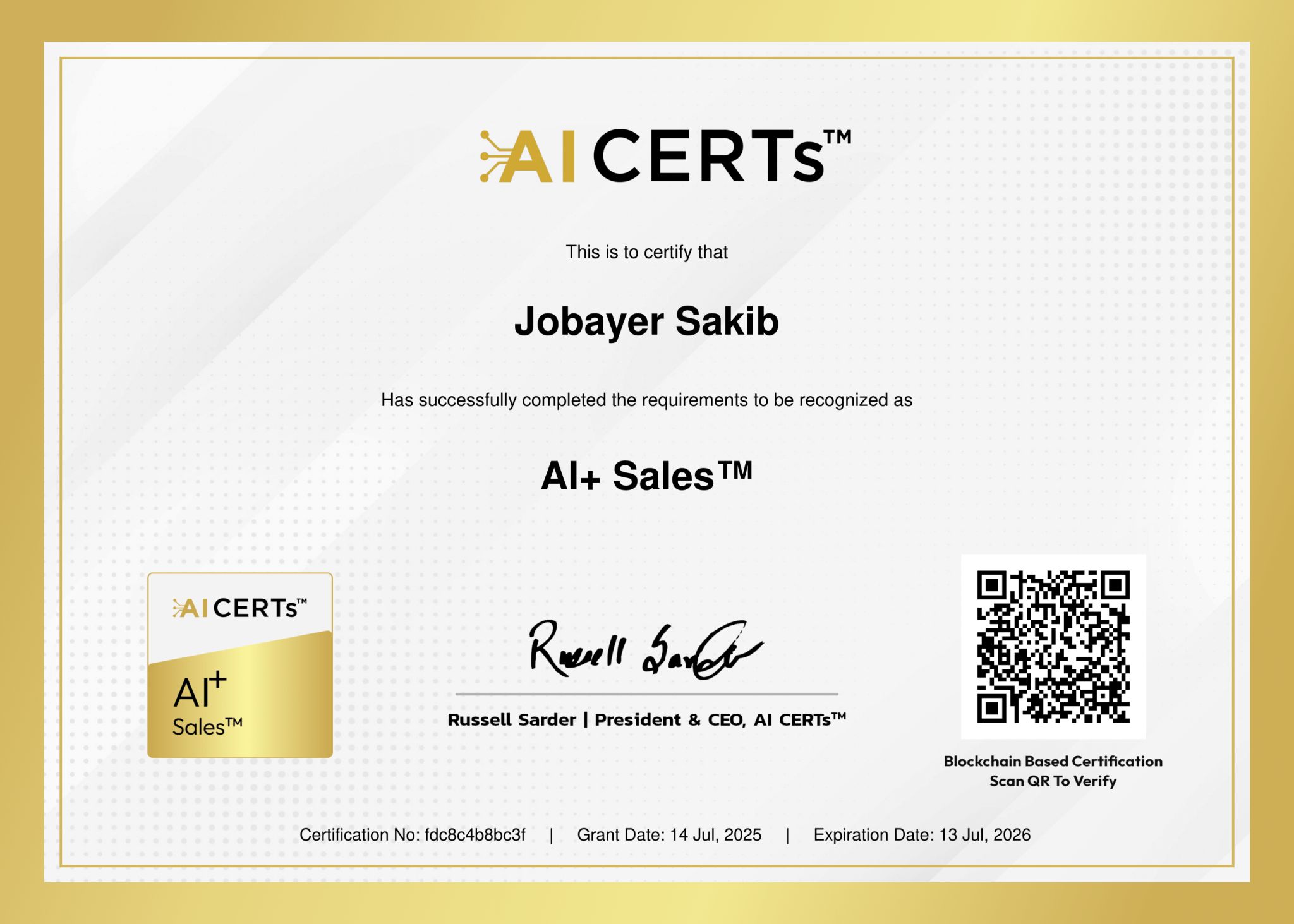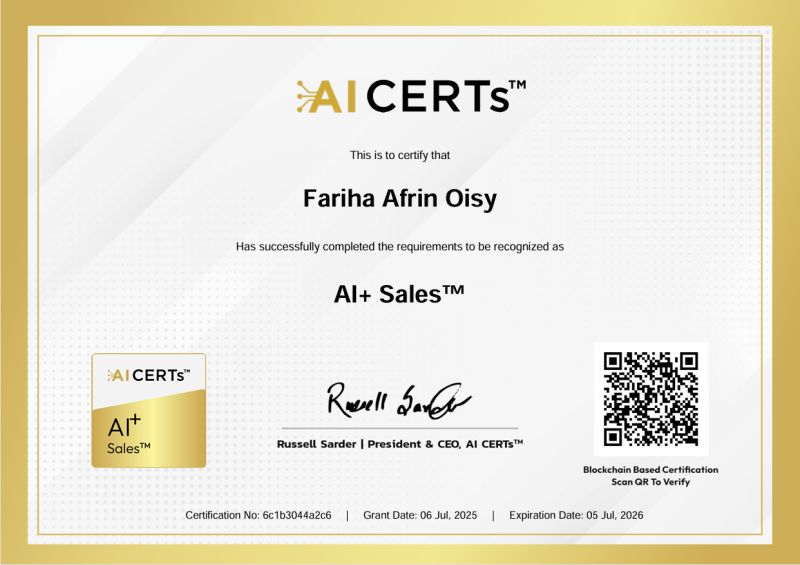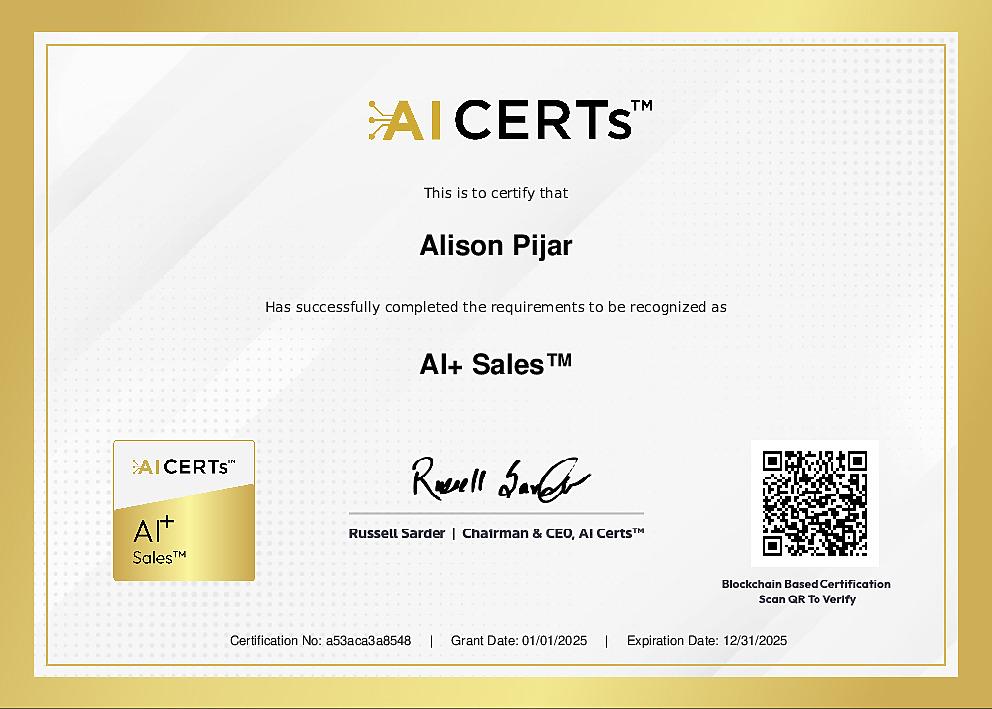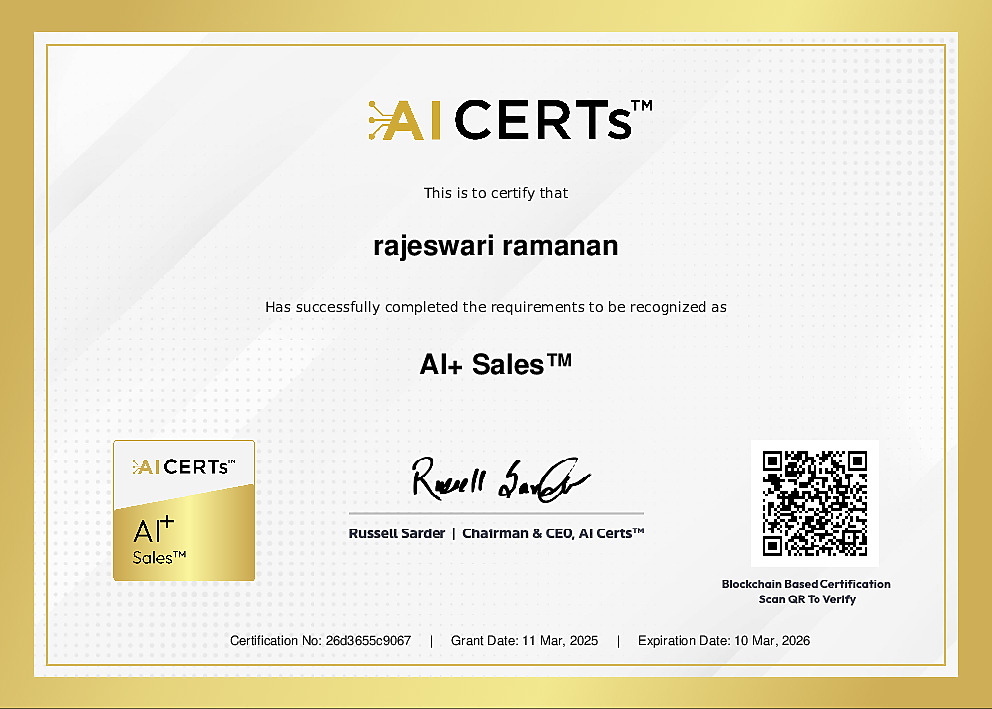AI+ Sales™
AP-270
Boost Sales Success Through AI-Driven Insights- Sales Transformation: Harness AI to boost sales operations, CRM integration, and forecasting
- Hands-on Approach: Practical workshops covering AI tools and ethical sales practices
- Data-Driven Insights: Learn to analyze, optimize, and automate sales processes
- Growth-Oriented: Drive ethical business growth and maximize performance
Why AI Sales™? 10X AI Powered Sales Impact
At a Glance: Course + Exam Overview
- Instructor-Led: 1 day (live or virtual)
- Self-Paced: 8 hours of content

Who Should Enroll?
Sales Executives: Use AI to automate sales processes and enhance customer relationship management for improved sales performance.
Marketing Professionals: Integrate AI with marketing strategies to customer targeting, personalization, and engagement.
Business Development Managers: Leverage AI-driven insights to identify new business opportunities and drive growth.
Product Managers: Utilize AI to understand customer needs, optimize pricing strategies, and improve product positioning.
Consultants: Help organizations implement AI-powered sales strategies that drive profitability and operational efficiency.
Industry Growth: Empowering Sales Professionals with Data-Driven AI Insights
- The global AI in sales market is expected to reach $17.5 billion by 2026, growing at a CAGR of 34.5%. (Source: MarketsandMarkets)
- Companies are adopting AI tools to enhance their sales processes, improve conversion rates, and automate lead generation.
- AI enables sales teams to gain deep insights into customer behavior, predict preferences, and personalize offers.
- As AI adoption in sales grows, there is a strong demand for professionals who can manage AI-driven sales strategies.
- AI is increasingly integrated into customer relationship management (CRM) systems, allowing for better lead scoring, personalized marketing, and data-driven sales forecasting.

Skills You’ll Gain
- Leveraging Sales Data with AI
- Exploring AI Technologies for Sales
- Integrating AI into CRM Systems
- Applying AI for Sales Forecasting
- Enhancing Sales Processes with AI
- Navigating Ethical Considerations and Bias in AI Sales
- Implementing AI-Driven Strategies for Sales Optimization
What You'll Learn
- Course Introduction
- 1.1 Fundamentals of AI
- 1.2 Historical Journey and Evolution of AI in Sales
- 1.3 AI Tools & Technologies Transforming Sales
- 1.4 Benefits and Challenges in Adoption of AI in Sales
- 1.5 Real-world Examples and Applications of AI in Sales
- 1.6 Future of AI in Sales
- 2.1 Categories of Sales Data
- 2.2 Techniques for Effective Data Collection
- 2.3 Basics of Data Analysis and Interpretation
- 2.4 Data Management Methods
- 2.5 Data Protection Principles
- 2.6 Data Integration in CRM Systems
- 2.7 Overview of Analytical Tools
- 2.8 Ethical Use of Sales Data
- 2.9 Case Studies: Real-World Data Applications
- 3.1 Introduction to Machine Learning in Sales
- 3.2 Predictive Analytics: Forecasting Sales Trends
- 3.3 NLP: Enhancing Customer Interactions
- 3.4 Chatbots: Automating Customer Service
- 3.5 Segmentation: Tailoring Customer Experiences
- 3.6 Personalization: Customizing Sales Approaches
- 3.7 Recommendation Engines: Driving Product Suggestions
- 3.8 Sales Automation: Streamlining Sales Processes
- 3.9 Performance Analysis: Measuring Sales Effectiveness
- 4.1 Foundation of CRM Systems
- 4.2 AI Integration into CRM Systems
- 4.3 Lead Scoring
- 4.4 Customer Insights
- 4.5 Sales Automation
- 4.6 Personalized Communication
- 4.7 Chatbots in CRM
- 4.8 Gaining Actionable Insights from Data
- 4.9 Case Studies
- 5.1 Introduction to Sales Forecasting
- 5.2 Overview of Predictive Models in Forecasting
- 5.3 Data Preparation for Analysis
- 5.4 Identifying Sales Patterns and Trends
- 5.5 Enhancing Forecast Reliability
- 5.6 Key Forecasting AI Tools in AI
- 5.7 Utilizing Real-time Data for Forecasts
- 5.8 Developing Forecasts for Different Outcomes
- 5.9 Measuring the Success of Sales Forecasts
- 6.1 Task Automation
- 6.2 AI-driven Email Marketing
- 6.3 Social Media with AI Analytics
- 6.4 AI-powered Lead Generation
- 6.5 Customer Segmentation
- 6.6 Optimizing Sales Visits and Calls
- 6.7 Tailoring Content with AI Insights
- 6.8 Real-time Sales Activity Monitoring
- 6.9 Upselling and Cross-selling with AI
- 7.1 Ethical Use of AI in Sales
- 7.2 Bias Identification in AI Systems
- 7.3 Bias Mitigation
- 7.4 Transparency in AI Decision-Making
- 7.5 Accountability for AI Actions
- 7.6 Safeguarding Customer Data
- 7.7 Regulatory Compliance
- 7.8 Building Customer Trust through Ethical AI
- 7.9 Anticipating Ethical Issues in AI Advancements
- 8.1 Scenario-Based Exercises
- 8.2 Addressing Sales Challenges with AI
- 8.3 Collaborative AI Implementation Plans
- 1. What Are AI Agents
- 2. Types of AI Agents
- 3. Applications and Trend of AI Agents in Sales
Tools You’ll Master

Salesforce Einstein

Conversica

Uniphore
Prerequisites
- Basic familiarity with sales processes and terminologies to comprehending the application of AI in sales.
- Fundamental proficiency in data analysis concepts to grasp the significance of data-driven decision-making in sales.
- Primary knowledge of CRM systems to understand the integration of AI technologies for sales optimization.
- Participants should have proactive interest in exploring the potential of artificial intelligence to transform sales processes and overall revenue growth.
Exam Details
Duration
90 minutes
Passing Score
70% (35/50)
Format
50 multiple-choice/multiple-response questions
Delivery Method
Online via proctored exam platform (flexible scheduling)
Exam Blueprint:
- Introduction to Artificial Intelligence (AI) in Sales - 13%
- Understanding Data in Sales - 13%
- AI Technologies for Sales - 13%
- Implementation of AI in CRM Systems - 13%
- Sales Forecasting with AI - 13%
- Enhancing Sales Processes with AI - 13%
- Ethical Considerations and Bias AI - 13%
- Practical Workshop - 9%
Choose the Format That Fits Your Schedule
What’s Included (One-Year Subscription + All Updates):
- High-Quality Videos, E-book (PDF & Audio), and Podcasts
- AI Mentor for Personalized Guidance
- Quizzes, Assessments, and Course Resources
- Online Proctored Exam with One Free Retake
- Comprehensive Exam Study Guide
- Access for Tablet & Phone
Instructor-Led (Live Virtual/Classroom)
- 1 day of intensive training with live demos
- Real-time Q&A and peer collaboration
- Led by AI Certified Trainers and delivered through Authorized Training Partners
Self-Paced Online
- ~8 hours of on-demand video lessons, e-book, and podcasts
- Learn anywhere, anytime, with modular quizzes to track progress
Discover Your Ideal Role-Based Certifications and Programs!
Not sure which certifications to go for? Take our quick assessment to discover the perfect role-based certifications and programs tailored just for you.
Get CertifiedFrequently Asked Questions
Participants gain fundamental knowledge in AI, including its historical evolution in sales, current AI tools transforming sales practices, and future AI trends. Practical workshops reinforce theoretical learning, enabling participants to implement AI-driven strategies effectively in their sales environments.
Participants will acquire skills in AI-driven sales forecasting, CRM system integration, customer segmentation, and personalized sales approaches. They will also learn to analyze sales data effectively, utilize AI tools for lead scoring and automation, and mitigate biases in AI applications for ethical sales practices.
In today's competitive market, AI is revolutionizing sales strategies. This equips participants with the expertise to stay ahead by optimizing sales processes, enhancing productivity through automation, and navigating ethical considerations associated with AI adoption in sales.
No, currently we do not provide customization options for our certification.
Graduates of the enhance their professional profiles by demonstrating proficiency in AI-driven sales strategies and ethical AI practices. They become equipped to drive business growth ethically, navigate evolving AI technologies, and capitalize on emerging trends in AI-powered sales optimization.



